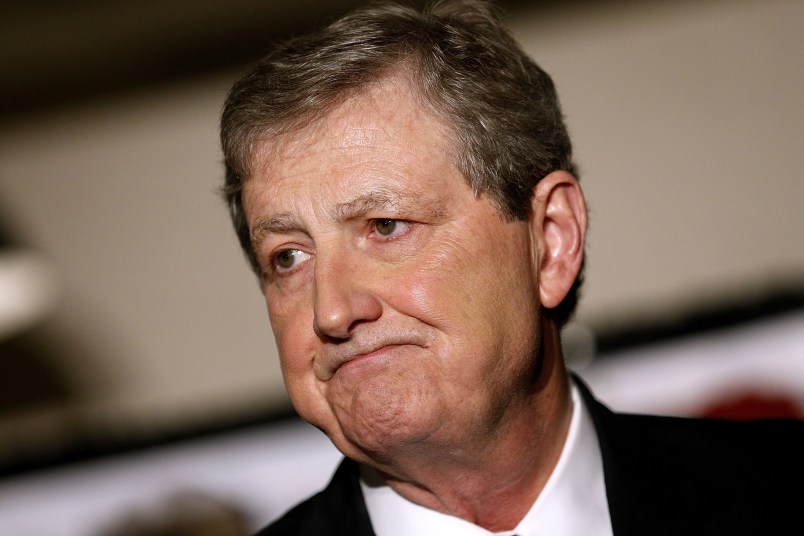BATON ROUGE, La. (AP) — By sidestepping the Louisiana governor’s race, U.S. Sen. John Kennedy denied Republicans a popular, high-profile candidate to pit against Democratic incumbent John Bel Edwards, renewing speculation about whether the GOP can rally around one main contender in 2019.
The list of Republicans considering a challenge to Edwards shortened in recent weeks, as most seemed willing to step aside for Kennedy, a popular figure in Louisiana with impressive fundraising prowess.
But Kennedy’s decision against entering the race threatened to start a free-for-all of governor wannabes jumping into a competition Republicans hope will unseat the only Democratic governor in the Deep South.
“There’s no challenger on the horizon who brought to the table the power and name recognition and popularity of a John Kennedy,” said Baton Rouge-based pollster Bernie Pinsonat. “It’ll be interesting to see how this develops.”
After months of speculation, Kennedy announced Monday that he wouldn’t run for governor, declaring, “I love being in the United States Senate” and saying he can best serve Louisiana in his current job.
While Democrats celebrated the exit of a formidable opponent, Republican leaders said they still can coalesce around one major candidate for the October election.
“There are many decisions, many discussions to come. There’s time. There’s not any time to be wasted, but there is time,” said Louis Gurvich, chairman of the state Republican Party. “I would hope by end of the first quarter (of 2019), we’ll have emerged with a solid candidate. We’re certainly not in a panic mode.”
Beyond the power of incumbency, Edwards maintains solid job approval ratings with voters.
Already among Republicans, U.S. Rep. Steve Scalise and Attorney General Jeff Landry said they wouldn’t run for governor, with Scalise remaining one of the top Republicans in the U.S. House and Landry saying he enjoys his current job and intends to seek re-election. U.S. Rep. Garret Graves also earlier squelched talk he was eyeing next year’s gubernatorial election.
So far, the only announced GOP challenger to Edwards is wealthy Baton Rouge businessman Eddie Rispone. Though he’s a first-time candidate for office unfamiliar to voters, Rispone can self-finance his campaign — and he’s said he’s willing to put $5 million or more into the race.
Attention also has shifted to U.S. Rep. Ralph Abraham, who represents a northeast Louisiana-based district and said he will have a decision “very soon.”
“Louisiana needs a strong leader who can take on the challenges we face, and our great state just isn’t getting that with the current governor. My family and I are talking about answering this call to serve,” the congressman said in a statement.
State Sen. Sharon Hewitt also is considering the race, and state Treasurer John Schroder started floating his name once Kennedy announced his decision.
Some Republicans are hoping to persuade Landry, who frequently clashes with Edwards, to change his mind. When asked if Landry was reconsidering a bid for governor, Landry’s campaign spokesman wouldn’t comment.
While GOP leaders want a strong contender, they don’t want a packed Republican field. They fear a repeat of the 2015 governor’s race that saw then-U.S. Sen. David Vitter lose his front-runner status amid fierce criticism from other major GOP contenders who wounded Vitter’s candidacy and helped Edwards emerge the winner.
Pinsonat said Edwards’ re-election chances “have improved” with Kennedy out of the race. But he said Republicans still have a shot at ousting the Democratic incumbent in a state where President Donald Trump remains highly popular and the GOP holds every other statewide office.
“Louisiana’s still a red state. Republicans aren’t in bad shape. They’ve just got to get past the fact that what they thought is their best opportunity has gone off into the sunset,” Pinsonat said.



